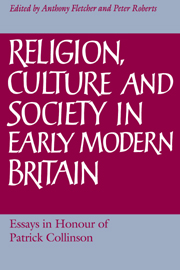Book contents
- Frontmatter
- Contents
- List of illustrations
- List of contributors
- Preface
- List of abbreviations
- Patrick Collinson
- 1 Nicolas Pithou: experience, conscience and history in the French civil wars
- 2 Elizabethan players and minstrels and the legislation of 1572 against retainers and vagabonds
- 3 Cleanliness and godliness in early modern England
- 4 Blood is their argument: men of war and soldiers in Shakespeare and others
- 5 Pragmatic readers: knowledge transactions and scholarly services in late Elizabethan England
- 6 The gardens of Sir Nicholas and Sir Francis Bacon: an enigma resolved and a mind explored
- 7 The Protestant idea of marriage in early modern England
- 8 James VI and I: furnishing the churches in his two kingdoms
- 9 A British patriarchy? Ecclesiastical imperialism under the early Stuarts
- 10 The Anglo-Scottish Union 1603–1643: a success?
- 11 Popery, purity and Providence: deciphering the New England experiment
- 12 Provincial preaching on the eve of the Civil War: some West Riding fast sermons
- 13 Popular form, Puritan content? Two Puritan appropriations of the murder pamphlet from mid-seventeenth-century London
- 14 The two ‘National Churches’ of 1691 and 1829
- Bibliography of the published writings of Patrick Collinson, 1957–1992
- Index
11 - Popery, purity and Providence: deciphering the New England experiment
Published online by Cambridge University Press: 03 December 2009
- Frontmatter
- Contents
- List of illustrations
- List of contributors
- Preface
- List of abbreviations
- Patrick Collinson
- 1 Nicolas Pithou: experience, conscience and history in the French civil wars
- 2 Elizabethan players and minstrels and the legislation of 1572 against retainers and vagabonds
- 3 Cleanliness and godliness in early modern England
- 4 Blood is their argument: men of war and soldiers in Shakespeare and others
- 5 Pragmatic readers: knowledge transactions and scholarly services in late Elizabethan England
- 6 The gardens of Sir Nicholas and Sir Francis Bacon: an enigma resolved and a mind explored
- 7 The Protestant idea of marriage in early modern England
- 8 James VI and I: furnishing the churches in his two kingdoms
- 9 A British patriarchy? Ecclesiastical imperialism under the early Stuarts
- 10 The Anglo-Scottish Union 1603–1643: a success?
- 11 Popery, purity and Providence: deciphering the New England experiment
- 12 Provincial preaching on the eve of the Civil War: some West Riding fast sermons
- 13 Popular form, Puritan content? Two Puritan appropriations of the murder pamphlet from mid-seventeenth-century London
- 14 The two ‘National Churches’ of 1691 and 1829
- Bibliography of the published writings of Patrick Collinson, 1957–1992
- Index
Summary
In 1636, Thomas Allen, Rector of St Edmund's, Norwich, delivered a ringing affirmation of his work in the Church of England, to protest against a sentence of excommunication imposed on him for refusing to conform to Bishop Wren's Injunctions:
I neither can nor dare rest from the Exercise of my Ministry … I was exhorted and charged by the Bishop … to have in remembrance unto how high an Office I was Called … A Messenger, a Watchman, a Pastor & Steward of the Lord … to feed and provide for the Lord's family … and to see that I never ceased my Labor.
Loyalty to the church was at stake. But who had become disloyal? As Allen saw it, the authorities pressed him to accept unlawful innovations, beyond the ‘Lawes and Ordinances of the Church by Parliament established’. To Clement Corbet, the bishop's chancellor, Allen and his like took pride in ‘sily Inventions’, and jeopardised ‘the goode foundation of doctryn and disciplyn’. Allen left Norwich for New England in 1638, and soon held office as minister to the church at Charlestown, Massachusetts. In the winter of 1639–40, he crossed the Charles river every Thursday to join the crowds that listened to John Cotton preach at the Boston lecture.
- Type
- Chapter
- Information
- Religion, Culture and Society in Early Modern BritainEssays in Honour of Patrick Collinson, pp. 257 - 289Publisher: Cambridge University PressPrint publication year: 1994
- 1
- Cited by



